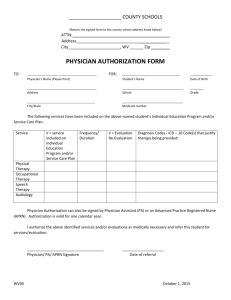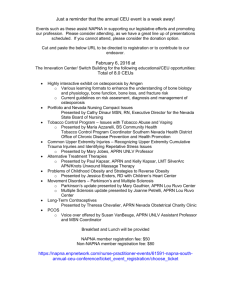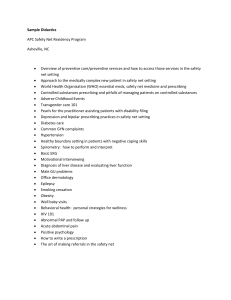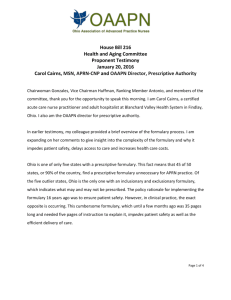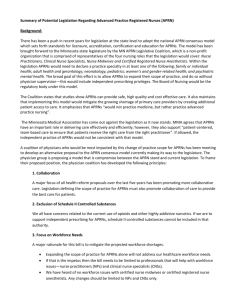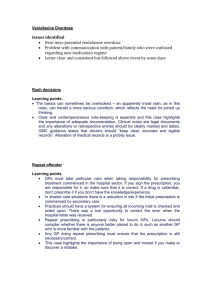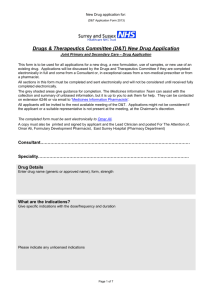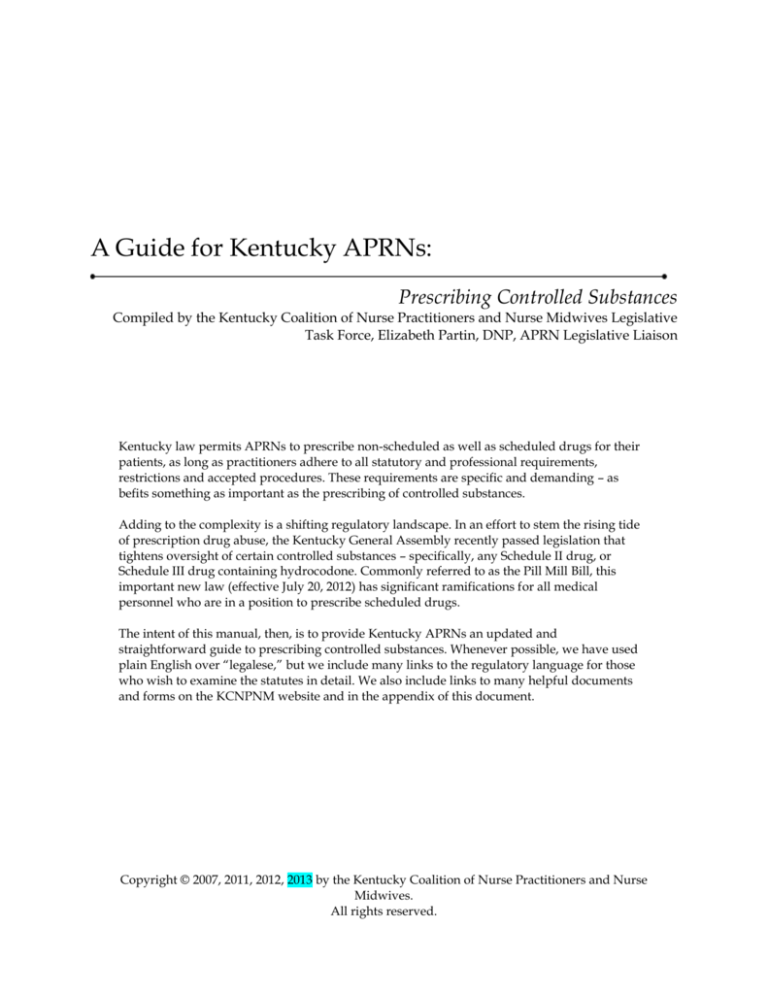
A Guide for Kentucky APRNs:
Prescribing Controlled Substances
Compiled by the Kentucky Coalition of Nurse Practitioners and Nurse Midwives Legislative
Task Force, Elizabeth Partin, DNP, APRN Legislative Liaison
Kentucky law permits APRNs to prescribe non-scheduled as well as scheduled drugs for their
patients, as long as practitioners adhere to all statutory and professional requirements,
restrictions and accepted procedures. These requirements are specific and demanding – as
befits something as important as the prescribing of controlled substances.
Adding to the complexity is a shifting regulatory landscape. In an effort to stem the rising tide
of prescription drug abuse, the Kentucky General Assembly recently passed legislation that
tightens oversight of certain controlled substances – specifically, any Schedule II drug, or
Schedule III drug containing hydrocodone. Commonly referred to as the Pill Mill Bill, this
important new law (effective July 20, 2012) has significant ramifications for all medical
personnel who are in a position to prescribe scheduled drugs.
The intent of this manual, then, is to provide Kentucky APRNs an updated and
straightforward guide to prescribing controlled substances. Whenever possible, we have used
plain English over “legalese,” but we include many links to the regulatory language for those
who wish to examine the statutes in detail. We also include links to many helpful documents
and forms on the KCNPNM website and in the appendix of this document.
Copyright © 2007, 2011, 2012, 2013 by the Kentucky Coalition of Nurse Practitioners and Nurse
Midwives.
All rights reserved.
July x, 2012
Table of Contents
Page
Prescribing Prerequisites for APRNs
APRN Responsibilities and Scheduled Drug Prescribing
At-A-Glance Scheduled Drug Laws for APRNs
Requirements for Prescribing Scheduled Drugs
Prescribing Checklist
Exceptions to the Prescribing Rules
CAPA-CS
DEA Registration
KASPER
Frequently Asked Questions
Appendix
KBN Guideline to APRNs on Controlled Substance
Prescriptive Authority: Defining Same or Similar Specialty
DEA Application Guide
3
3
4
5
5
5
6
6
7
9
12
13
15
2
July x, 2012
Prescribing Prerequisites for APRNs
Non-scheduled drugs
APRNs in Kentucky are authorized to prescribe non-scheduled legend drugs, but must first have a
Collaborative Agreement for Prescriptive Authority for Non-Scheduled Drugs (CAPA-NS) with a physician. The
APRN needs to keep the original agreement, and have a copy available at his or her primary practice site.
(For a sample agreement, go to www.kcnpnm.org/?page=forms). APRNs must have separate
collaborative prescribing agreements for non-scheduled and scheduled drugs.
Scheduled drugs
The prerequisites for prescribing scheduled drugs are considerable, as are the ongoing legal and medical
responsibilities once an APRN has received prescriptive authority. To get prescriptive authority, an
APRN:
1.
Must have been licensed to practice as an APRN for at least one year
2.
Must enter into a Collaborative Agreement for APRN Prescriptive Authority for Controlled
Substances (CAPA-CS) with a physician that defines the scope of prescriptive authority for
controlled substances (see CAPA-CS section)
3.
Must register with the Drug Enforcement Administration (DEA) to receive a DEA Controlled
Substance Registration Certificate and number (see DEA section and Appendix)
4.
Must register with KASPER, Kentucky’s electronic system for monitoring prescriptions of
controlled substances (see KASPER section)
5.
Must notify the Kentucky Board of Nursing (KBN) of his/her CAPA-CS and the physician’s
name; and also must submit a copy of the DEA Registration Certificate
APRN Responsibilities and Scheduled Drug Prescribing
The Kentucky Board of Nursing holds APRNs responsible for the scheduled drug prescriptions they
write. You must be knowledgeable about the drugs you prescribe and understand when it is appropriate
to prescribe them. If you are not certain about the indications, dose or side effects of a medication, do not
prescribe it until you thoroughly familiarize yourself with the drug.
The law also requires there be a valid medical reason for prescribing a scheduled drug (KRS Chapter
218A.180). Make sure that documentation exists in the patient record regarding any conditions (acute or
chronic) for which you are prescribing. If a patient requires chronic medication for a condition, make sure
to document radiological tests, laboratory tests, physical exams and/or consultations with a specialist in
the patient chart. The Pill Mill Bill further delineates the practices and procedures required in the
prescribing of controlled substances. See the Prescribing Checklist.
The Board of Nursing is authorized by law to monitor APRN prescribing of scheduled drugs through
KASPER. APRN prescribing patterns will be closely watched by those who are concerned about drug
diversion and substance abuse, and by those who opposed APRNs having this expanded prescriptive
authority. Don’t let yourself be pressured by patients or others to prescribe medication that you do not
feel comfortable prescribing. In the end, you will be held accountable for the prescriptions you write.
The following chart summarizes the scheduled drug laws for APRNs. For a comprehensive listing of
scheduled drugs, consult the DEA website (www.deadiversion.usdoj.gov/schedules/schedules.htm).
However, some drugs may be exempted on the Federal list but scheduled by Kentucky, so if in doubt
3
July x, 2012
about the schedule of a particular drug, check with your local pharmacist or the Drug Control Branch in
Frankfort, at 502.564.7985.
Scheduled Drug Laws for APRNs at a Glance*
Drug
Schedule
KASPER Query
Maximum
prescription
Refills
Method of
prescription
Prescription
Expiration
II
Required before
prescribing and
at least every 3
months during
treatment
72 hours *
(see psych
mental health
exception,
below)
No
Written only
60 days after date
of issue
III (combination
Hydrocodone
products in liquid
and solid form)
Required before
prescribing and
at least every 3
months during
treatment
30 days
No
Written, oral
or fax
Six months after
date of issue
IV (Ativan,
Klonopin,
Valium, Xanax
and Soma)
Required before
prescribing and
at least every 3
months during
treatment
30 days
No
Written, oral
or fax
Six months after
date of issue
IV (other)
Required before
prescribing and
at least every 3
months during
treatment**
Original
prescription
Maximum six
month supply
Written, oral
or fax
Six months after
date of issue
V
Not required
Original
Maximum six
Written, oral
Six months after
prescription
month supply
or fax
date of issue
* APRNs nationally certified in psychiatric/mental health nursing may prescribe a 30-day supply of psychostimulants.
** Some exemptions apply. See exemptions for KBN regulation.
Your CAPA-CS may place additional restrictions on your prescribing authority.
Prescribing pre-requisites for APRNs:
1.
2.
3.
4.
5.
Licensed to practice as an APRN for at least 1 year
CAPA-CS (Collaborative Agreement for APRN prescriptive Authority for Controlled Substances)
DEA registration and certificate number
Notify Kentucky Board of Nursing of CAPA-CS and physician name; submit copy of DEA certificate.
Obtain KASPER account.
Additionally, the physical prescription itself must adhere to required standards. Specifically, a
prescription:
Must be dated and signed by the practitioner on the date issued.
Must contain the name, address, and DEA registration number of the practitioner.
Must have the full name and address of the patient.
Must contain the drug name, strength, dosage form, quantity prescribed, and directions for use.
May have only one prescription per blank.
4
July x, 2012
May not be pre-printed with the name of a controlled substance.
Must indicate number of refills.
For more detail regarding actual prescriptions, consult the Kentucky Revised Statute KRS 218A.180 and
Kentucky Administrative Regulation (902 KAR 55:105).
Requirements for Prescribing Scheduled Drugs
Kentucky statutes – including additional requirements of the Pill Mill Bill – as well as KBN regulations
delineate very specific requirements for prescribing controlled substances. The following checklist
summarizes those requirements, as stipulated by the Pill Mill Bill and the KBN. If you would like to read
the law in its entirety, click here for the complete statute and nursing regulations.
Prescribing Checklist
(except for exemptions):
✓ Gather patient’s medical history, conduct patient examination and document everything in
the patient’s medical record; (psych providers will perform a psychiatric exam)
✓ Query KASPER for all available data on the patient
✓
diagnostics required
✓ Include an exit strategy, including potentially discontinuing the use of controlled
substances
✓ Discuss the risks and benefits of the use of controlled substances with the patient,
including the risk of tolerance and drug dependence (or discuss with the parent if the
patient is a minor, or with the patient’s legal guardian or health care surrogate)
✓ Obtain written consent for the treatment when prescribing a Schedule II or Schedule III hydrocodone.
A written consent is not required for Schedule III (except hydrocodone), Schedule IV or Schedule V.
For subsequent prescriptions:
✓ Obtain necessary updates on the patient’s medical condition and modify the treatment plan
as necessary
✓ Query the KASPER system at least once every three months during the course of treatment before
issuing a new prescription or a refill for a controlled substance
Continuing Education
The law also requires APRNs to obtain 1.5 contact hours of continuing education each year related to the
use of KASPER, pain management or addiction disorders. The 1.5 continuing education hours will be
part of the total 5 pharmacology contact hours now required.
5
July x, 2012
Exceptions to the Prescribing Rules
As with most laws, there are some important exceptions in the statutes and regulations regarding
prescribing controlled substances.
Exceptions in the statute that apply to Schedule II and Schedule III drugs that contain hydrocodone:
Administering or prescribing a controlled substance immediately prior to, during or within
fourteen (14) days following an operative or invasive procedure or delivery if the prescribing or
administering is medically related to the operative or invasive procedure or delivery and the
medication usage does not extend beyond the fourteen (14) days.
Administering or prescribing a controlled substance necessary to treat a patient in an emergency
situation;
For administration in a hospital or long-term-care facility if the hospital or long-term-care facility
with an institutional account, or a practitioner in those hospitals or facilities where no
institutional account exists, queries the electronic monitoring system established in Section 3 of
this Act for all available data on the patient or resident for the twelve (12) month period
immediately preceding the query within twelve (12) hours of the patient's or resident's admission
and places a copy of the query in the patient's or resident's medical records during the duration
of the patient's stay at the facility
Prescribing as part of the patient’s hospice or end of life treatment;
Prescribing for the treatment of pain associated with cancer or the treatment of cancer;
Prescribing a single dose to relieve anxiety, pain or discomfort experienced by a patient
submitting to a diagnostic test or procedure;
Prescribing Within seven (7) days of an initial prescribing or dispensing if the prescribing or
dispensing;
a) Is done as a substitute for the initial prescribing or dispensing;
b) Cancels any refills for the initial prescription; and
c) Requires the patient to dispose of any remaining unconsumed medication;
Prescribing within ninety (90) days of an initial prescribing if the prescribing is done by another
practitioner in the same practice or in an existing coverage arrangement, if done for the same
patient for the same medical condition; or
Prescribing to a research subject enrolled in a research protocol approved by an institutional
review board that has an active federal-wide assurance number from the United States
Department of Health and Human Services, Office for Human Research Protections where the
research involves single, double, or triple blind drug administration or is additionally covered by
a certificate of confidentiality from the National Institutes of Health
Exceptions in the KBN Regulation that apply to Schedule III drugs (except those that contain
hydrocodone), Schedule IV and Schedule V drugs
Administering or prescribing a controlled substance or anesthesia immediately prior to, during,
or for up to seven days following surgery or an invasive procedure;
Administering a controlled substance necessary to treat a patient in an emergency situation:
1. At the scene of an emergency;
2. In a licensed ground or air ambulance; or
3. In an emergency department of a hospital, except as provided in subsection 11 of this section
6
July x, 2012
Prescribing a controlled substance for a hospice patient or any end of life care;
A patient admitted to a licensed hospital as an inpatient, outpatient, or observation patient,
during and as part of the patient’s normal and expected course of care at that hospital;
A patient who is a registered resident of a long term care facility as defined in KRS 216.510
Prescribing during the effective period of any disaster or situation with mass casualties that have
a direct impact on the APRN’s practice
Prescribing a single dose of a controlled substance to relieve anxiety, pain, or discomfort related
to a diagnostic test or procedure;
Prescribing a limited amount of a controlled substance for a short period of time for an
established patient to assist the patient in responding to the anxiety of a non-recurring event;
Treatment associated with cancer;
Administering or prescribing controlled substances to prisoners in a state or county correctional
facility; or
Prescribing of a Schedule V controlled substance;
Additional Provisions of the KBN Regulation
Regulatory standards may be accomplished by different licensed practitioners in a single group
practice if:
(a) Each practitioner involved has lawful access to the patient’s medical record;
(b) Each practitioner performing an action to meet these standards shall be acting within the legal
scope of their practice; and
(c) There is adequate documentation in the patient’s medical record reflecting the actions of each
practitioner.
When prescribing a controlled substance for the treatment of chronic, non-cancer pain, the
APRN, in addition to the requirements of this section, shall, if appropriate, obtain a base line
drug screen and further random drug screens as deemed necessary by the APRN.
7
July x, 2012
When prescribing a controlled substance for patients younger than sixteen (16) years of age, the
APRN shall obtain and review an initial KASPER report. When prescribing a controlled
substance for an individual sixteen (16) years of age or older, the requirements of this section
shall apply.
The CAPA-CS
The CAPA-CS, or Collaborative Agreement for APRN Prescriptive Authority for Controlled Substances, is a
cornerstone of APRN prescribing authority. The chart lists the requirements and suggestions for
compliance.
CAPA-CS particulars
Must be in writing, and must be
signed by both the APRN and the
physician
It may state simply that the APRN has authority to prescribe
scheduled drugs as stated in the statute and regulation, or it may
list additional limitations, depending on the physician who cosigns the agreement. Click here for a sample agreement
(www.kcnpnm.org/?page=forms).
Must describe how the APRN and
physician will collaborate and
communicate about scheduled drug
prescriptions
This can be simple or detailed. A simple example: The APRN and
physician will collaborate and communicate when necessary in person,
by phone or electronically.
APRN and physician must be
qualified in the same or a similar
specialty
In other words, the populations served or disorders treated by
the APRN are similar to that of the collaborating physician’s. (To
see the KBN guidelines on defining the same or similar
specialty, click here (include link to the KBN document).
APRN keeps the original document,
provides copies at practice site(s)
Do not turn over the original document to others, but rather
provide copies as requested. A copy of the CAPA-CS must be
available at each practice site where you provide services.
APRN notifies KBN
You must notify KBN of each CAPA-CS agreement and the
name of the collaborating physician. Click here for the form you
must complete and mail to the KBN
(www.kcnpnm.org/?page=forms). Do not send a copy of the
agreement to KBN unless they request one.
Copy of agreement to DEA
You must mail or fax a completed copy of each CAPA-CS to the
DEA before that agency will issue you a number. If you have
more than one CAPA-CS, you must send a copy of each
agreement to the DEA.
Either the APRN or the physician may rescind the prescribing
agreement by written notice sent via registered mail. A written
Rescinding a CAPA-CS
8
July x, 2012
notice also must be sent via registered mail to the KBN and the
Kentucky Board of Medicine.
DEA Registration
Kentucky law requires that APRNs register with the Drug Enforcement Agency in order to prescribe
scheduled drugs. DEA registration must be renewed every three years, and the fee for applying is $731
(payable by credit card or check).
To register online, or to print and mail your application, go to www.deadiversion.usdoj.gov.
You can also call the DEA at 1-800-882-9539 to request an application (DEA Form 224).
Additionally, you must also mail or fax a completed copy of your CAPA-CS to the DEA office before a
DEA number will be issued. If you have more than one CAPA-CS, you must send a copy of each
agreement to the DEA.
To fax copy of CAPA-CS
Fax to:
Debra S. DeVitis
Registration Program Specialist
Detroit DEA Office
Fax # 313-226-7546
To mail copy of CAPA-CS
Mail to:
DEA
211 W. Fort St., Suite 610
Detroit, Michigan 48226
ATTN: Debra S. DeVitis, Registration Program
Specialist
For assistance in completing your DEA application, click here to see the special DEA Application Guide.
Other required DEA notifications
You also must notify the DEA if there is a change in:
Your name – if you change your name, you must notify the DEA as well as the Kentucky Board
of Nursing.
Your address – if you change your primary practice location, you must notify the DEA. Your
application for renewal is mailed to the address on your DEA certificate. The post office cannot
forward the renewal application, so if the DEA doesn’t have your current practice address, you
will not receive your renewal application and your registration will expire.
Schedules prescribed – If you have a change in the schedules that you prescribe because your
CAPA-CS has changed, you must notify the DEA.
There is no additional DEA charge for changing your name, business address, or the schedules that you
prescribe.
KASPER (Kentucky All Schedule Prescription Electronic Reporting)
Effective July 20, 2012, Kentucky law requires that APRNs who prescribe scheduled drugs must be
registered on the KASPER system. In fact, anyone who is authorized to prescribe or dispense scheduled
controlled substances must be registered with KASPER. This system helps health care providers identify
9
July x, 2012
patients who may be at risk, and catalogs all Schedule II-V controlled substance prescriptions dispensed
with the state.
Before prescribing any scheduled drug for their patients, APRNs must query the KASPER database to
ascertain that the patient is not receiving similar or the same medications from other providers.
(Pharmacies and dispensers of controlled substances must report to KASPER within 7 days.) Reports are
available 24 hours a day, seven days a week, and are usually generated within 15-20 seconds. The report
includes:
the date a prescription was issued
the drug name
amount prescribed
prescriber name and city
pharmacy name and city
An APRN may discuss the KASPER information with the patient, another health care provider treating
the patient, or law enforcement. KASPER reports may be filed in the patient record to become a
permanent part of the file
How to register
There is no fee to register on the KASPER system. To register, go to
http://chfs.ky.gov/os/oig/KASPER.htm and click into the eKASPER Paperless Registration Process. Or
go to https://ekasper.chfs.ky.gov/accessrequest/, click on “Print Instructions”, and follow them to
complete and submit the online form. Then you must print the online form and affix copies of all
requested licensure information and mail to:
Cabinet for Health and Family Services
Office of Inspector General
Drug Enforcement Branch
275 East Main Street, 5E-D
Frankfort, KY 40621
The KASPER site also has a helpful online tutorial that explains how to use the system.
If you spot a red flag
If you suspect a patient has been provider shopping or receiving an inordinate amount of prescriptions,
there are several things you can do.
1) Verify the information. Although rare, mistakes can be made in the KASPER system – patients
with the same name or birthdate, for example. You should contact the pharmacies or providers to
verify that your patient received the prescriptions.
2) Discuss the report findings with the patient.
3) If you believe the KASPER information is accurate and that your patient is abusing or diverting
drugs, you can report that information to local or state law enforcement. If you aren’t sure who
that is, call the Drug Enforcement and Professional Practices Branch at 502-564-7985. It is not a
HIPPA violation to report suspected drug diversion to law enforcement officials.
4) Some practices choose to “dismiss” patients who are suspected of abusing or diverting drugs, but
you must give the patient at least 30 days notice via registered mail. If you do dismiss the patient
from your practice, you must continue to provide care during the 30-day time frame.
KASPER also tracks an APRN’s prescribing practices
Remember that the law permits the Kentucky Board of Nursing to request a KASPER report that lists all
the prescriptions for scheduled drugs prescribed by an APRN.
10
July x, 2012
Frequently Asked Questions
Where do I get an application to apply for a DEA number?
You may call the Drug Enforcement Administration at 1-800-882-9539 to request an application (DEA
Form 224) or download an application online and mail it with a check. However, it is faster and preferred
by the DEA that you register on line and pay by credit card. To obtain an application online or to print
and mail go to: http://www.deadiversion.usdoj.gov.
When can I apply for a DEA number?
Anytime. Remember, though, that the numbers are not granted immediately. The DEA first needs to
verify your licensure and the schedules you are allowed to prescribe based on the statute, regulations and
CAPA-CS.
What is the cost for registering with the DEA?
The cost is $731.00 for a 3-year registration and the fee is nonrefundable. However, if you are a Federal,
State or Local government employee the fee can be waived.
What if I don’t want a DEA number?
APRNs are not required to obtain a DEA number. However, DEA numbers are widely used as provider
identifiers by the health care industry. Without a DEA number, APRN prescriptions for non scheduled
drugs are not being properly attributed to the prescriber and in some instances, prescriptions are denied
at the pharmacy. Additionally, APRN services are not being credited to the APRN. It is recommended
that APRNs obtain a DEA number, even if they do not prescribe scheduled drugs. APRNs now have an
opportunity to be identified with each prescription they write, making them a more visible part of the
health care delivery system.
How often must a DEA registration be renewed?
A renewal application must be completed every three years.
What if I already have a DEA number in another state?
DEA numbers are specific to each state. If you will be prescribing scheduled drugs in Kentucky, then you
must apply for a DEA number in Kentucky. You can transfer a DEA number from one state to another.
There is no charge for this as long as your DEA number in the other state is current. If you plan to
prescribe scheduled drugs in two states, then you must have a separate DEA number for each state.
Can the Collaborative Agreement for Prescriptive Authority for Controlled Substances (CAPA-CS)
and the Collaborative Agreement for Prescriptive Authority for Non Scheduled Drugs (CAPA-NS) be
combined as one document?
No. These two agreements are separate documents. They have different requirements and should not be
combined. You may also obtain a copy of a sample Collaborative Agreement for Prescribing Non
Scheduled Drugs (CAPA-NS) by clicking www.kcnpnm.org/?page=forms.
The APRN must keep the original CAPA-NS and CAPA-CS and keep a copy of each separate agreement
at each practice site. These agreements must be readily available if the Board of Nursing requests a copy.
Do I need to notify the Kentucky Board of Nursing (KBN) of my CAPA-CS?
Yes, APRNs must notify KBN of the existence of the CAPA-CS and the name of the collaborating
physician. KBN will provide a form to be used for this purpose and you may not substitute another form.
The form is available on the KBN web site at www.kbn.ky.gov or by clicking
www.kcnpnm.org/?page=forms. KBN will then notify the KBML that a CAPA-CS exists and provide the
name of your collaborating physician. If you have more than one CAPA-CS, you must notify KBN of each
agreement.
11
July x, 2012
Is there a sample Collaborative Agreement for Prescriptive Authority for Controlled Substances
(CAPA-CS)?
Yes. Click here: www.kcnpnm.org/?page=forms.
What do I need to do if my CAPA-CS changes or is rescinded by either party?
The APRN does not need to notify KBN if the conditions of the CAPA-CS change and the collaborating
physician remains the same. If the APRN changes collaborating physicians, the APRN must notify KBN
of the new CAPA-CS and the name of the new collaborating physician. The CAPA-CS may be rescinded
by either party (APRN or physician) upon written notice via registered mail to the other party and to the
Kentucky Board of Nursing and the Kentucky Board of Medical Licensure.
Do I need to send a copy of my CAPA-CS to the DEA?
Yes, you must send a copy, either by fax or mail, to the DEA office before a DEA number will be issued. If
you have more than one CAPA-CS, you must send a copy of each agreement
To fax copy of CAPA-CS,
Fax to: Debra S. DeVitis
DEA Registration Program Specialist
Detroit DEA Office
Fax # 313 226-7546
To mail copy of CAPA-CS
Mail to:
DEA
211 W. Fort St., Suite 610
Detroit, Michigan 48226
Attn: Debra S. DeVitis, Registration
Program Specialist
12
July x, 2012
Do I need to notify KBN of my CAPA-NS?
No, you do not need to notify KBN of the CAPA-NS, but you must keep the original agreement
and have a copy available at your practice site.
Are there different requirements regarding the prescribing of Schedule II, III, IV and V drugs?
Yes. See the At-A-Glance chart on page x.
Do I need to check KASPER every 3 months for Schedule IV and Schedule V drug
prescriptions?
Yes. If you have given a patient a prescription for a drug with more than a 3-month supply, you
are still responsible for doing a KASPER query at 3 months. For those prescriptions, we
recommend that you set up some type of tickler system to remind you when to recheck KASPER.
Or, you could simply limit the prescription to a three-month supply.
Do the scheduled drug prescribing laws apply to APRNs who write orders for controlled
substances in health care facilities such as hospitals and nursing homes?
Yes. APRNs who work in health care facilities such as hospitals and nursing homes may write
orders for controlled substances. The same legal requirements apply to APRN prescriptions
regardless of where the prescription/order is written. Therefore, if a schedule II drug is ordered
by an APRN for a patient in a health care facility, that order must be rewritten every 72 hours.
What if I work at more than one location?
When applying for a DEA number, use the address of your primary site of practice.
Since the statute requires that a copy of the CAPA-CS be available at each site where the
APRN is providing care, does this mean that each facility where the APRN provides care must
have a copy of the CAPA-CS?
A copy of the CAPA-CS must be available at the site where the APRN is providing care. The
APRN can choose to carry a copy of the CAPA-CS (for instance, a reduced copy may be carried in
the wallet) or the APRN may choose to have the facility keep a copy in their files. Remember: the
APRN must keep the original copy of the CAPA-CS.
If I am an APRN certified in psych/mental health but I am self-employed or work in a private
practice, may I prescribe a 30 day supply of a psychostimulant?
Yes. KRS 314.011 (a) states that “…Prescriptions issued under this subsection for
psychostimulants may be written for a thirty (30) day supply only by an advanced practice
registered nurse certified in psychiatric-mental health nursing who is providing services in a
health facility as defined in KRS Chapter 216B.” The definition of health facilities in KRS 216B:
(12) "Health facility" means any institution, place, building, agency, or portion thereof,
public or private, whether organized for profit or not, used, operated, or designed to
provide medical diagnosis, treatment, nursing, rehabilitative, or preventive care and
includes alcohol abuse, drug abuse, and mental health services. This shall include, but
shall not be limited to, health facilities and health services commonly referred to as
hospitals, psychiatric hospitals, physical rehabilitation hospitals, chemical dependency
programs, tuberculosis hospitals, skilled nursing facilities, nursing facilities, nursing
homes, personal care homes, intermediate care facilities, family care homes, primary care
centers, rural health clinics, outpatient clinics, ambulatory care facilities, ambulatory
surgical centers, emergency care centers and services, ambulance providers, hospices,
community mental health and mental retardation centers, home health agencies, kidney
disease treatment centers and freestanding hemodialysis units, facilities and services
13
July x, 2012
owned and operated by health maintenance organizations directly providing health
services subject to certificate of need, and others providing similarly organized services
regardless of nomenclature.
If I am not certified in psych/mental health, but I work in a hospital or mental health clinic as
defined in KRS Chapter 216B, may I write a prescription for a 30-day supply of a schedule II
psychostimulant?
No. Only APRNs certified in psychiatric/mental health may prescribe a 30-day supply of
schedule II psychostimulants. All other APRNs may only prescribe a 72-hour supply of those
drugs.
Would it be legal for an APRN certified as both an adult psych-mental health NP and a Family
Nurse Practitioner (FNP), who is employed at a comp care center, to prescribe a 30-day supply
of psychostimulants to children?
An APRN certified in adult psych-mental health may prescribe a 30-day supply of
psychostimulants for adults but not children. An APRN certified as an FNP may prescribe a 72hour supply of psychostimulants for children.
Does the name or DEA number of the collaborating physician need to be on the prescription?
No. The name and DEA number of the collaborating physician should not be on a prescription
written by an APRN. The name and DEA number of the APRN must be on the prescription. The
CAPA-CS is not intended to be a substitute for the exercise of professional judgment by the
APRN, which means that the APRN is responsible for the medications he/she prescribes.
Are there requirements for what must be included on a controlled substance prescription?
Yes. See the discussion on page 4 (under the APRN Responsibilities and Scheduled Drug
Prescribing) or consult the Kentucky Revised Statute KRS 218A.180 and Kentucky Administrative
Regulation (902 KAR 55:105).
May prescriptions for scheduled drugs be called into or transmitted by fax to a pharmacy?
Only prescriptions for schedules III, IV or V may be transmitted to a pharmacy by fax or by
phone. If a schedule III, IV or V prescription is faxed to a pharmacy, the transmitting practitioner,
or the practitioner’s agent, must write or stamp FAXED prior to transmission, on the face of the
original prescription along with the date and the person’s initials. The original prescription must
be filed in the patient’s record.
What if I don’t want to prescribe schedule II, etc.?
A DEA number does not mean that you will be required to prescribe a certain schedule. As with
any drug, if you don’t feel comfortable prescribing a particular medication, you should not do so.
Having a DEA number does not mean you relinquish your ability to say no.
Where can I find a list of scheduled drugs?
Remember, some drugs are exempted on the Federal list, but they may be scheduled by the state.
The DEA web site provides a Federal list of scheduled drugs at
www.deadiversion.usdoj.gov/schedules/schedules.htm. Drug references, as part of the
description of the drug, will also provide the schedule of a drug; but remember, these lists are
most likely based on the Federal scheduled list. If in doubt about the schedule of a drug, check
with your local pharmacist, or the Drug Control Branch in Frankfort, at 502-564-7985.
May an APRN dispense controlled substances?
No, an APRN may not dispense controlled substances.
14
July x, 2012
Do I need to check KASPER every 3 months for Schedule IV drug prescriptions?
Yes. If you have given a patient a prescription for a drug with more than a 3 month supply, you
are still responsible for doing a KASPER query at 3 months. For those prescriptions, we
recommend that you set up some sort of tickler system to remind you when to re-check KASPER.
Or, you could simply limit the prescription to a 3 month supply
APPENDIX
KBN Guideline to Advanced Practice Registered Nurses on Controlled
Substance Prescriptive Authority: Defining Same or Similar Specialty
DEA Application Guide
15
July x, 2012
KENTUCKY BOARD OF NURSING
312 Whittington Parkway, Suite 300
Louisville, Kentucky 40222-5172
http://kbn.ky.gov
KBN GUIDELINE TO
ADVANCED PRACTICE REGISTERED NURSES (APRN)
ON CONTROLLED SUBSTANCE PRESCRIPTIVE AUTHORITY:
DEFINING SAME OR SIMILAR SPECIALTY
KRS 314.042(9)(d), as amended by Senate Bill (SB) 65 (2006), sets the following requirement:
The APRN who is prescribing controlled substances and the collaborating physician shall be
qualified in the same or in a similar specialty.
How is “specialty” determined?
The APRN’s specialty is determined by his or her certification. The physician’s specialty is
determined by either the physician’s certification from the American Board of Medical Specialties
(ABMS), or as individually established by the physician. It should be noted that certification is
not required as a condition of physician licensure, nor is the physician’s scope of practice limited
by certification. Concerning physician specialties, the ABMS states:
Some specialists are primary care doctors, such as family physicians, general internists, and
general pediatricians. Other specialists concentrate on certain body systems, specific age groups,
or complex scientific techniques developed to diagnose or treat certain types of disorders.
The requirement stated in KRS 314.042(9)(d) raises additional questions as follows:
1) How is the term “similar specialty” defined?
2) Whom may the APRN collaborate with for controlled substance prescriptive authority?
3) Based on this collaboration, what, if any, further limitations to the controlled substance
prescriptive authority exist?
As a general guideline for APRNs and physicians, and for the purpose of prescribing scheduled
drugs, the Board of Nursing will expect the APRN’s certification and the physician’s specialty to
have an overlap in order to qualify as “a similar specialty.” This means that the populations
served or the disorders treated by the APRN are similar to that of the collaborating physician’s
populations served or disorders treated. For example, a Family Nurse Practitioner (FNP) who
treats children has an overlap in practice with that of a pediatrician or a family physician, and
thus, shares a similar specialty of practice. Similarly, a Pediatric Nurse Practitioner (PNP), who
by statute already has a limited scope of advanced practice and can only treat children, has an
overlap in practice with a pediatrician or a family physician.
The Board has also determined that in accordance with SB 65, the collaborating physician’s
certification or specialty does not, in and of itself, limit the APRN’s controlled substance
prescriptive authority. The scope of controlled substance prescriptive authority, other than what
is set out in the statutes, must be written in the Collaborative Agreement for APRN Prescriptive
Authority for Controlled Substances (CAPA-CS)*. Subsequently, if an FNP treats children and
collaborates with a pediatrician, and if the parties wish to limit the FNP to controlled substance
prescriptions for children only, that must be set forth in the CAPA-CS. If a PNP collaborates with
16
July x, 2012
a family physician, then the PNP is already limited to writing controlled substance prescriptions
for children only. If the parties wish to further limit the PNP’s controlled substances prescriptive
authority, then the limitations must be set forth in the CAPA-CS.
If no further limitations are listed in the CAPA-CS, other than those limitations listed in KRS
Chapter 314, then the APRN may prescribe the controlled substances as specified by KRS
Chapter 314 that are within the APRN’s scope of practice. (201 KAR 20:057 Scope and standards
of advanced registered nursing practice.)
Note that KRS 314.042(9)(c) states that the CAPA-CS shall describe the arrangement for
collaboration and communication between the APRN and the physician regarding the
prescribing of controlled substances.
In summary, when an APRN and physician do not have the same specialty area of practice, then
the APRN is encouraged to establish the CAPA-CS with a physician who has a substantial
overlap in practice with that of the APRN. By law, the APRN and physician must minimally
share a similar specialty area of practice.
Prior to prescribing controlled substances, the APRN should assure that all the requirements
specified in KRS 314.042 are met. Additional information on APRN prescriptive authority and a
copy of the statute is on the Board’s website at www.kbn.ky.gov
Specific questions should be addressed to Bernadette Sutherland, MSN, RN, Nursing Practice
Consultant, at (502) 429-3307, or by email at BSutherland@ky.gov.
*KRS 314.042(9) states:
“Before an APRN engages in the prescribing of Schedules II through V controlled substances as
authorized by KRS 314.011(8), the APRN shall enter into a written “collaborative agreement for
the APRN’s prescriptive authority for controlled substances” (CAPA-CS) with a physician that
defines the scope of the prescriptive authority for controlled substances…”
Section (a) through (h) of this same statute state further requirements for the CAPA-CS. In
addition, KRS 314.042(9)(i) states:
“The CAPA-CS shall state the limits on controlled substances which may be prescribed by the
APRN, as agreed to by the APRN and the collaborating physician. The limits may be more
stringent than either the schedule limits on controlled substances established in subsection (8) of
Section 1 of this Act, or…”
Approved: 08/2006
17

